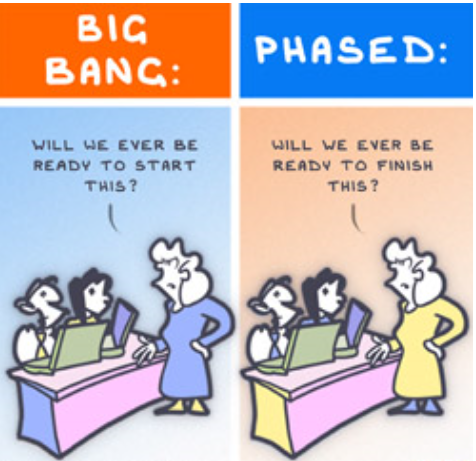Which ERP Implementation is Best?
When your company decides to undergo an ERP implementation, you will be faced with the decision of which type of implementation roll-out best suits your business needs; the big bang or the phased approach. The two follow very different philosophies of ERP implementation and go-live. The big bang approach is where the company launches the new system on the go-live date and they must figure out any kinks as an organization as they come. The phased approach is where the rollout is staggered in steps across departments and modules so that there are several small test environments for solving problems happening before the whole business is introduced to the new ERP software. It is your job as an organization to decide which ERP implementation method is the best fit for your business.
 The big bang approach is essentially where the entire ERP software goes live at one time; including all modules and functionality. A lot of planning will need to go into this type of implementation so that chaos does not ensue upon go-live. Organizations that choose this method usually do so to keep everything standard across the entire business. This way there is one roll-out for everyone, standardized training for everyone, not to mention the disruption to the business only once. Each user will be learning together and can lend each other support, not to mention you won’t have to keep up training sessions for as long as a phased go-live would take. There is no doubt that this implementation method is higher risk, but it can be the most reasonable for some businesses, especially ones on the smaller side. The one must have your organization needs to pull off this approach, is a strong ERP project team and IT support. Smaller businesses must rely on ERP Consultants heavily for this approach to work within their business because you will need to immediately address support tickets and questions as they arise. If you don’t and issues sit unresolved, your users will not embrace nor use the system. This would be a huge waste of your time and resources.
The big bang approach is essentially where the entire ERP software goes live at one time; including all modules and functionality. A lot of planning will need to go into this type of implementation so that chaos does not ensue upon go-live. Organizations that choose this method usually do so to keep everything standard across the entire business. This way there is one roll-out for everyone, standardized training for everyone, not to mention the disruption to the business only once. Each user will be learning together and can lend each other support, not to mention you won’t have to keep up training sessions for as long as a phased go-live would take. There is no doubt that this implementation method is higher risk, but it can be the most reasonable for some businesses, especially ones on the smaller side. The one must have your organization needs to pull off this approach, is a strong ERP project team and IT support. Smaller businesses must rely on ERP Consultants heavily for this approach to work within their business because you will need to immediately address support tickets and questions as they arise. If you don’t and issues sit unresolved, your users will not embrace nor use the system. This would be a huge waste of your time and resources.
The phased approach is a low-risk method of ERP implementation where you roll the software out incrementally vs. all at once. By doing so, you give your organization the ability to fix a module or correct features that might not be functioning up to standard before the entire organization must deal with the problems. You can plan your resources over a longer period, so that it’s a much more controlled implementation. Your organization has total control over how the phases occur as you could roll out distinct ERP modules one at a time, deploy the whole ERP system across different business departments, or across different geographical offices. The choice is essentially yours. Phasing obviously increases the time a project takes, so it is not the best method for companies trying to stay on a strict go-live deadline. It is also not ideal if you prefer to keep a unified sense of urgency and excitement about an implementation across the entire company, as this would mean users wouldn’t all be on the same schedule. This method usually does not make the most sense for a small organization, as if you don’t have the number of employees to support this, you are just wasting resources by dragging the implementation out.
There are probably experts out there that will argue their case on why one method is better over the other. The reality is that there are pros and cons to both implementation methods, and only your organization is qualified to decide what best fits the needs of your business. I recommend only doing so with the help of your ERP Consultant. 2W Tech is a Certified Epicor ERP Partner and has experienced ERP Consultants on staff that can help your organization plan and execute the best ERP implementation.
Read More:
Office 365 Workplace Analytics
Has Your Customized ERP Taken On A Life Of Its Own
Choosing the Right ERP Solution to Support a Global Business Whitepaper
Enjoyed reading this article? Click the button below to download this asset.
Download “Choosing the Right ERP Solution” Now
Choosing the Right ERP Solutions to Support a Global Business Whitepaper
Please complete the form to download the file.